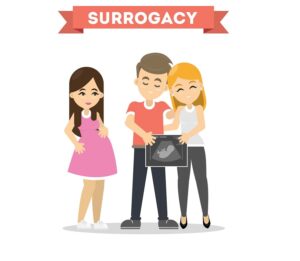
(Image via Getty)
The past couple of months have had some concerning stories coming out of Ukraine when it comes to surrogacy. The images, especially, have been shocking. We’ve seen pictures of newborn babies lined up in bassinets, in a crowded hotel room, with a couple of caregivers. The babies have been unable to be united with their parents due to COVID-19 travel restrictions. However, in good news, loosening restrictions over the summer have enabled some parents to make it to their babies.
Of course, to be fair, similar situations have been happening all over the world. A number of babies born by surrogacy in the United States have been separated from their non-United States parents, prevented from making the births due to COVID-19 restrictions. And, in some instances, after the parents were able to make it to the United States, they were unable to return home with their children because of additional COVID-related issues, such as an inability to obtain a passport from passport offices that have essentially shut down.

7 Key Trends In Law Firm Rate Negotiations
And how to navigate them in 2026.
So is Ukraine just getting especially bad press during distressing times? Or is there a bigger issue?
I had a chance to interview (and record for the podcast I Want To Put A Baby In You) author Jay Nault. Nault and his wife reside in California. However, when they found out they would need to turn to surrogacy in order to have another child and learned of the price tag associated with the process in the United States, they turned to surrogacy in Ukraine.
Nault is in the process of publishing a book on his misadventures to parenthood by way of the Ukraine. He shared some of the more memorable moments with us.
You Have To Be Heterosexual. Married. And Able to Prove It.
Both the United States and Ukraine have become destinations for those hoping to have a child by surrogacy but unable to do so in their own country. However, one of the biggest differences between the two is that Ukraine requires all intended parents in surrogacy arrangements to be married heterosexual couples. By contrast, in most states in the United States, an intended parent in a surrogacy arrangement can be married or not, to a same- or different-sex partner, or single.
The more surprising part, at least for Nault, was that he and his wife were required to produce an apostilled original version of their marriage certificate. In his case, this involved his wife making a last-minute trip to Hawaii, the destination state of their nuptials, and implementing some persuasive tactics with a state official to receive the required apostille (like a notarization by the state).
You Have To Set Up A Company In The Ukraine.
Nault described another surprising facet of his surrogacy journey in Ukraine. He was required to set up and register a company in the country. At least that was how it was explained to him. He signed the Ukrainian paperwork, which was, of course, in Ukrainian (Nault did not speak or read the language). When he asked if the business creation would delay the process, he was assured that everything was being taken care of for him. (This is definitely not a step that is part of the process in the United States.)
Ukraine Does Not Recognize Suffixes.
This may not be a problem for most people, but it’s also not unheard of for an American to have a suffix in their name, or to name a child with a suffix. In Nault’s case, he is a “III.” When his twin sons were born, he and his wife decided to pass on the family name to one of their children, intending to name the baby James Nault IV. However, the birth certificate listed baby and dad identically as James Nault III, and twin brother as Michael Nault III. Ha! Nault asked to fix the names but was told it would require going through the Ukranian judicial system. He ultimately opted to wait and undergo the name change process for the boys once back in the United States.
Nault’s Eastern European experience was one of constantly feeling like a fish out of water. Funny, strange, and, at times, scary. But, in the end, he brought home his sweet, perfect boys.
It is unfair to generalize the quality of a whole country’s system based on an unfortunate situation during a global disaster or one person’s experience. But it is widely known that Ukraine’s system likely has a number of flaws and, undoubtedly, people who are looking to exploit the system.
The United States also has it problems. But despite those issues, the challenges of a language barrier and a foreign legal system cause me to recommend sticking with the United States. But when that isn’t an option, I can certainly understand looking elsewhere — despite additional risk and discomfort — in order to hold on to hope.
 Ellen Trachman is the Managing Attorney of Trachman Law Center, LLC, a Denver-based law firm specializing in assisted reproductive technology law, and co-host of the podcast I Want To Put A Baby In You. You can reach her at [email protected].
Ellen Trachman is the Managing Attorney of Trachman Law Center, LLC, a Denver-based law firm specializing in assisted reproductive technology law, and co-host of the podcast I Want To Put A Baby In You. You can reach her at [email protected].
